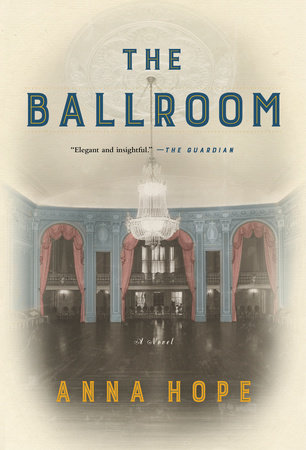The Ballroom
A Novel
Anna Hope
Ebook
September 6, 2016 | ISBN 9780812995169
AmazonApple BooksBarnes & NobleBooks A MillionGoogle Play StoreKobo
About the Book
A searing novel of forbidden love on the Yorkshire moors—“a British version of One Flew Over the Cuckoo’s Nest” (The Times U.K.)—from the author of the critically acclaimed debut Wake
England, 1911. At Sharston Asylum, men and women are separated by thick walls and barred windows. But on Friday nights, they are allowed to mingle in the asylum’s magnificent ballroom. From its balconies and vaulted ceilings to its stained glass, the ballroom is a sanctuary. Onstage, the orchestra plays Strauss and Debussy while the patients twirl across the gleaming dance floor.
Amid this heady ambience, John Mulligan and Ella Fay first meet. John is a sure-footed dancer with a clouded, secretive face; Ella is as skittish as a colt, with her knobby knees and flushed cheeks. Despite their grim circumstances, the unlikely pair strikes up a tenuous courtship. During the week, he writes letters smuggled to her in secret, unaware that Ella cannot read. She enlists a friend to read them aloud and gains resolve from the force of John’s words, each sentence a stirring incantation. And, of course, there’s always the promise of the ballroom.
Then one of them receives an unexpected opportunity to leave Sharston for good. As Anna Hope’s powerful, bittersweet novel unfolds, John and Ella face an agonizing dilemma: whether to cling to familiar comforts or to confront a new world—living apart, yet forever changed.
Praise for The Ballroom
“The Ballroom successfully blends historical research with emotional intelligence to explore the tensions and trials of the human condition with grace and insight.”—New York Times Book Review
“Part historical novel and part romance, The Ballroom paints an incredibly rich portrait of the mentally stable forced to live in an asylum. [Anna] Hope transports readers inside the asylum, to feel the thick humidity of the stale summer air of the day room, and the gritty and brutal reality inside those walls.”—Booklist
“A compelling cast of emotionally resonant characters, as well as a bittersweet climax, render Hope’s second novel a powerful, memorable experience.”—Publishers Weekly
“Hope’s writing is consistently beautiful. . . . Recommended for readers who enjoy historical fiction by Sarah Waters or Emma Donoghue.”—Library Journal
“A beautifully wrought novel, a tender, heartbreaking and insightful exploration of the longings that survive in the most inhospitable environments.”—Sunday Express
“The Ballroom has all the intensity and lyricism of [Anna] Hope’s debut, Wake. At its heart is a tender and absorbing love story.”—Daily Mail
“Compelling and masterful . . . Anna Hope has proven once again that she is a luminary in historical fiction. . . . She delivers profound, poignant narratives that stir the emotions.”—Yorkshire Post
“As with Hope’s highly acclaimed debut novel, Wake, the writing is elegant and insightful; she writes beautifully about human emotion, landscape and weather.”—The Observer
“A brilliantly moving meditation on what it means to be ‘insane’ in a cruel world . . . All the characters are vividly and sensitively drawn. . . . Deeply moving.”—The Irish Times
England, 1911. At Sharston Asylum, men and women are separated by thick walls and barred windows. But on Friday nights, they are allowed to mingle in the asylum’s magnificent ballroom. From its balconies and vaulted ceilings to its stained glass, the ballroom is a sanctuary. Onstage, the orchestra plays Strauss and Debussy while the patients twirl across the gleaming dance floor.
Amid this heady ambience, John Mulligan and Ella Fay first meet. John is a sure-footed dancer with a clouded, secretive face; Ella is as skittish as a colt, with her knobby knees and flushed cheeks. Despite their grim circumstances, the unlikely pair strikes up a tenuous courtship. During the week, he writes letters smuggled to her in secret, unaware that Ella cannot read. She enlists a friend to read them aloud and gains resolve from the force of John’s words, each sentence a stirring incantation. And, of course, there’s always the promise of the ballroom.
Then one of them receives an unexpected opportunity to leave Sharston for good. As Anna Hope’s powerful, bittersweet novel unfolds, John and Ella face an agonizing dilemma: whether to cling to familiar comforts or to confront a new world—living apart, yet forever changed.
Praise for The Ballroom
“The Ballroom successfully blends historical research with emotional intelligence to explore the tensions and trials of the human condition with grace and insight.”—New York Times Book Review
“Part historical novel and part romance, The Ballroom paints an incredibly rich portrait of the mentally stable forced to live in an asylum. [Anna] Hope transports readers inside the asylum, to feel the thick humidity of the stale summer air of the day room, and the gritty and brutal reality inside those walls.”—Booklist
“A compelling cast of emotionally resonant characters, as well as a bittersweet climax, render Hope’s second novel a powerful, memorable experience.”—Publishers Weekly
“Hope’s writing is consistently beautiful. . . . Recommended for readers who enjoy historical fiction by Sarah Waters or Emma Donoghue.”—Library Journal
“A beautifully wrought novel, a tender, heartbreaking and insightful exploration of the longings that survive in the most inhospitable environments.”—Sunday Express
“The Ballroom has all the intensity and lyricism of [Anna] Hope’s debut, Wake. At its heart is a tender and absorbing love story.”—Daily Mail
“Compelling and masterful . . . Anna Hope has proven once again that she is a luminary in historical fiction. . . . She delivers profound, poignant narratives that stir the emotions.”—Yorkshire Post
“As with Hope’s highly acclaimed debut novel, Wake, the writing is elegant and insightful; she writes beautifully about human emotion, landscape and weather.”—The Observer
“A brilliantly moving meditation on what it means to be ‘insane’ in a cruel world . . . All the characters are vividly and sensitively drawn. . . . Deeply moving.”—The Irish Times
Read more
Close




